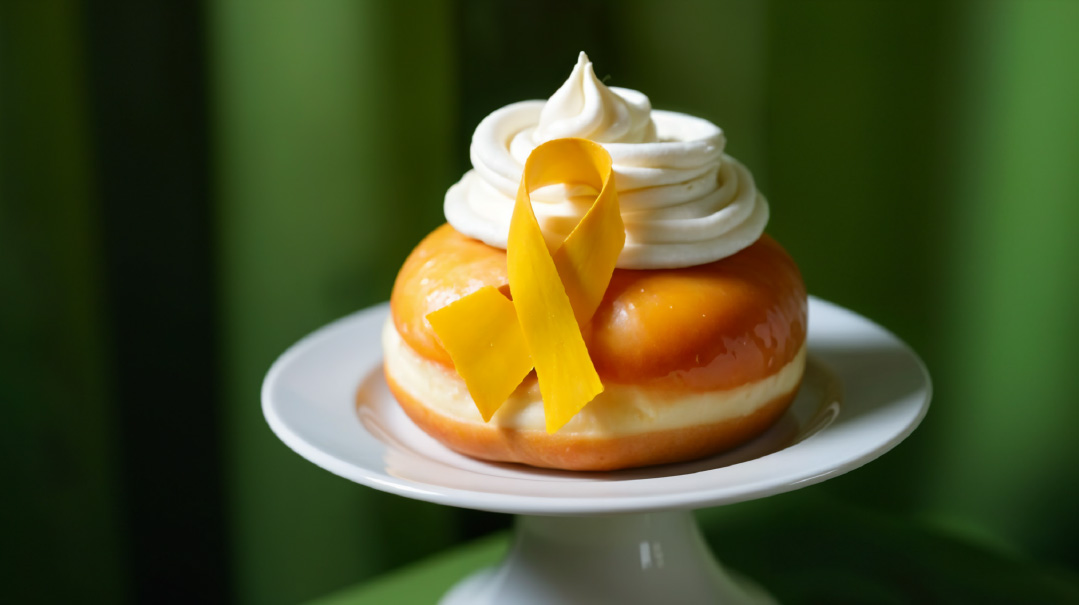Sweet and Sour

The sentiment was sweet, the bakers well-intentioned. But the reception was decidedly sour

INwhat has become a yearly routine, come Kislev, every Israeli bakeshop worth its name debuts a collection of doughnuts. The collections parade across print ads and screens — teasing potential customers with novel combinations of creams, custards, sprinkles, and chocolate shavings — and as you walk along the avenue, the fragrance of frying dough tickles noses and tastebuds.
This year, a popular Tel Aviv bakery rolled out its doughnut collection, and instead of hungry murmurings and outstretched credit cards, there was outrage. Accusations. Even a Holocaust reference.
The object of the ire was a doughnut slathered in yellow frosting and then topped with a generous dollop of whipped cream. Affixed to the whipped cream was a yellow fondant ribbon — twisted to form the internationally recognized symbol of solidarity for the hostages still captive in Gaza.
This is how the bakery explained its yellow-themed doughnuts: “This year we chose, in honor of the Chanukah holiday, to craft a culinary masterpiece in tribute to our amazing soldiers and the hostages who are so important to us, to give the soldiers proper respect and to increase awareness of the hostages’ plights… our customers who select these doughnuts will enjoy them in their homes, but at the same time they’ll be reminded… that there are hostages whom we only hope will return, so we can see them here with us.”
The sentiment was sweet, the bakers well-intentioned. But the reception was decidedly sour.
The responses generally took one of several approaches: You’re exploiting and commercializing personal tragedy by trying to make a buck (or shekel) from a tragedy. You’re mocking people’s suffering by coating it in cream, turning something somber and horrifying into a festive, sugary treat. Would you put a yellow star on a doughnut? And remember, our hostages definitely aren’t eating any doughnuts down in the Hamas tunnels — so how could you even consider concocting newer and better pastries when they’re suffering?
Israelis are passionate people who can get riled up pretty easily. But in all likelihood, those righteous finger-pointers probably knew, deep down, that the doughnut bakers weren’t motivated by avariciousness or cruelty. (In fact, they said a portion of their profits would go to the hostage families’ forum.) Maybe the yellow fondant has a sour taste, but piling hatred and anger over the creamy offerings won’t help the hostages either. You don’t have to be a psychologist to realize that beneath the whole story — whichever side you’re on — there’s just a lot of raw pain.
Last October, when this war began, we saw an outpouring of altruism. In addition to the intensely urgent tefillos, Tehillim, and extra learning sedorim, there was so much Jews around the globe could do and give. The doers got busy harvesting abandoned crops, tying tzitzis for soldiers, sourcing uniforms and ammunition, organizing rallies, and marshalling allies. The givers sent soldiers and evacuees tefillin and siddurim, challah and brownies, personalized letters and warm socks, even live musical entertainment.
And while a younger, more black-and-white me might have cynically discounted some of that enthusiastic giving as Wow, you gave these people who lost children, parents, or limbs a piece of steak. Isn’t that gallant of you, I’m older now and life has softened some of those tough edges. I’ve also been privileged to be on both the giving and receiving end of some truly beautiful initiatives. To cynical eyes, those initiatives might seem to suffice with giving someone in terrible pain something fresh to eat (which they probably aren’t all that hungry for, and which won’t even begin to mitigate their suffering). But upon a closer look, they actually follow a universally understood if unarticulated script. It goes something like this:
We so badly wish we could take away your suffering. But since we can’t, can we at least give you something to eat? And yes, we know this container of soup (or shopping voucher, or donation toward Yom Tov expenses, or ride to the hospital) seems so petty and small compared to the enormity of your pain, but we hope you realize it’s not about food. It’s about a tangible sign that you’re not completely on your own. That we care.
That’s the message we sounded during that original crescendo of unity, open hearts, and open pockets. All that doing and giving — some of it so desperately needed, some of it more of a heartfelt gesture, all of it warmly welcomed — it was because we wanted to show that we care.
During that wave of generosity, someone commented to me: You know, right now it’s easy to help. But at some point, it’s going to get harder. It’s not going to be about tangible things like donating money or baking cookies or sending scopes and ghillie suits to IDF snipers. It’s going to be about something deeper, more internal, more essential.
As yet another winter begins and the war drags on, I think about that comment often. There are still some ongoing initiatives to help families of reservists, hostages, or displaced citizens, but a year-plus into this war, the all-consuming wave of giving has largely receded. And so, along with our pain and grief at the plight of the hostages, there is also a wrenching frustration.
I would guess that frustration is what fueled the Tel Aviv doughnut outrage, and it’s played a major role in fraying the glorious unity of last October. Because we like to do. We’re good at doing. And our current state of impotence, of helplessness, is an infuriating (and humbling) place to be.
What can we actually do for the hostages? We definitely can’t send them warm vegetable soup. Fundraising campaigns or barbecues or impromptu chizuk concerts are not going to generate their yeshuah. Weekly rallies may be convenient outlets to express blame and anger, but they haven’t been very effective in softening the enemy’s stance (maybe the opposite). The security and political experts are still grappling to find an actual strategy that will get the hostages home — military dominance hasn’t yet achieved any mass Hamas capitulation, and the negotiations keep meeting the same sorry end.
Maybe that prediction — it’s going to be about something more essential — was true. Back when this all started, it was easier and more gratifying to focus on contributions we could measure and touch (and create heartwarming, stirring clips about). But maybe we’ve reached the point where most of the available options aren’t sweeping or grand. They’re not the types of things we mortals can measure, even though we know and trust they wield significant spiritual impact. They’re internal, personal, private.
A high school teacher once told us: If you really care, if you really cry over your friend’s pain, somehow they will know. They may not be able to articulate exactly how or why, but a heart can sense these things.
It’s easier to transfer money or even to chop vegetables and roll out cookie dough than to make real spiritual change. But in the end, if a heart really does know when someone cares — if it can sense the small, the internal, the private acts of empathy — then maybe, across the ravaged border in their underground prisons, our brothers and sisters can feel our not quite tangible but still very real offerings.
(Originally featured in Mishpacha, Issue 1039)
Oops! We could not locate your form.







